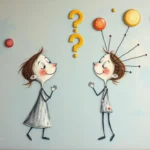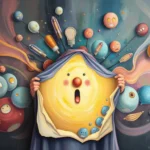
Introduction
Dreams have long captivated human imagination, serving as a window into our subconscious minds. They are a tapestry of our thoughts, feelings, and experiences, often rich with symbolism that can illuminate our waking lives. Understanding dream symbolism is not just a curious pursuit; it can provide profound insights into our emotions, desires, and fears. This article delves into the nuances of dream interpretation, focusing on how various symbols and scenarios can enrich our understanding of our inner worlds.
Why do some dreams linger in our minds long after we wake? What do they reveal about our current circumstances or future aspirations? By exploring the meanings behind common symbols and scenarios, we can gain valuable insights that resonate with our personal experiences.
Symbolism and Meaning
In dream analysis, symbols play a crucial role in deciphering the underlying messages of our subconscious. Here are some common symbols found in dreams and their meanings:
- Water: Represents emotions and the subconscious mind.
- Clear water may symbolize clarity of thought or emotional stability.
-
Stormy water could indicate emotional turmoil or unresolved issues.
-
Flying: Often associated with freedom and liberation.
- Flying high may signify a sense of achievement and confidence.
-
Struggling to fly can reflect feelings of inadequacy or fear of failure.
-
Chasing: Signifies anxiety or avoidance.
- If you are being chased, it may represent an issue you are trying to escape or avoid in your waking life.
-
Conversely, if you are the one chasing someone, this could indicate a pursuit of a goal or desire that feels just out of reach.
-
Falling: A common theme that often reflects feelings of loss of control or insecurity.
- Falling without a sense of fear may suggest a willingness to surrender to life’s uncertainties.
-
A dramatic fall can indicate a significant fear of failure or loss.
-
Doors: Symbolize choices and opportunities.
- Open doors represent new possibilities and decisions to be made.
- Closed doors can signify missed opportunities or feelings of confinement.
These symbols can vary in meaning based on individual experiences, cultural backgrounds, and personal circumstances. It is essential to consider not just the symbol itself but also the emotional response it evokes.
Different Perspectives
While many symbols have widely accepted meanings, personal interpretation plays a vital role. For example:
-
Cultural Differences: In some cultures, snakes may symbolize transformation or healing, while in others, they might represent deceit and danger. Understanding your cultural context can deepen your insight into your dream’s message.
-
Personal Associations: Consider your own experiences. For instance, if you have a fear of heights, a dream about flying might be less about freedom and more about confronting your fears.
Reflect on your own emotions and associations with each symbol to gain a more nuanced understanding of its meaning in your dream.
Key Scenarios and Variations
Dreams are not monolithic; they come in various scenarios that can alter their interpretations significantly. Here are some common variations and how they might change the meaning:
-
Recurring Dreams: If a particular theme or scenario recurs, it often indicates an unresolved conflict or ongoing issue in your life. Reflect on what the dream is trying to communicate repeatedly.
-
Nightmares: Disturbing dreams can reveal deep-seated fears or anxieties. A nightmare about being chased can be a sign that you are avoiding a critical issue in your life. Understanding the source of your fear can lead to personal growth.
-
Lucid Dreams: In these dreams, the dreamer is aware of their dreaming state and can often control the dream’s narrative. This can represent a desire for empowerment and control in your waking life. Use this awareness to confront fears or explore desires.
-
Transformational Dreams: Dreams that signify change (e.g., metamorphosis of an animal) can indicate personal growth or significant life transitions. These dreams often encourage embracing change rather than resisting it.
-
Shared Dreams: Occasionally, people experience similar dreams with friends or loved ones. This can point to shared concerns or collective experiences, reflecting the bond between individuals.
Personal Reflection
As you consider these scenarios, think about how your own dreams fit into these categories. Ask yourself:
- What recurring themes do I notice in my dreams?
- Are there specific fears or desires that seem to manifest in various forms?
- How do my dreams reflect my current life circumstances?
Real-Life Connections and Takeaways
Understanding the messages behind your dreams can enhance your self-awareness and provide valuable insights into your waking life. Here are some practical tips for connecting your dreams to real-life situations:
-
Keep a Dream Journal: Recording your dreams immediately after waking can help you remember details and emotions that might fade throughout the day. Over time, you’ll be able to identify patterns and recurring symbols.
-
Reflect on Emotions: Pay attention to how you felt during the dream. Emotions can be powerful indicators of what your subconscious is trying to communicate.
-
Ask Open-Ended Questions: When reflecting on your dreams, ask yourself questions such as:
- What does this dream reveal about my current emotional state?
- How does this dream relate to my waking life?
-
What actions can I take to address the issues presented in the dream?
-
Use Dreams as a Guide: If you notice a dream recurring, consider it a prompt to explore that aspect of your life further. For example, if you frequently dream of falling, it might be time to assess areas in your life where you feel a loss of control.
-
Seek Professional Guidance: If you find recurring themes distressing or confusing, talking to a therapist or counselor can provide support and additional insights into your dreams and their meanings.
Conclusion: Embrace Your Dreams
Dreams are a powerful tool for self-discovery and understanding. By exploring their symbols, scenarios, and meanings, you can uncover hidden truths about yourself and your life. Remember, the goal of dream interpretation is not to find definitive answers but to engage with your subconscious in a meaningful way. Embrace your dreams as a guide to navigate the complexities of your waking life.
As you reflect on your dreams, allow yourself to be curious and open-minded. Each dream is an invitation to explore your inner world and discover the wisdom it holds. So the next time you drift off to sleep, remember: your dreams might just be the key to unlocking your deepest self.







